Unit 5 Do you have a soccer ball? SectionB (1a-1d)课件(共39张PPT)
文档属性
| 名称 | Unit 5 Do you have a soccer ball? SectionB (1a-1d)课件(共39张PPT) | 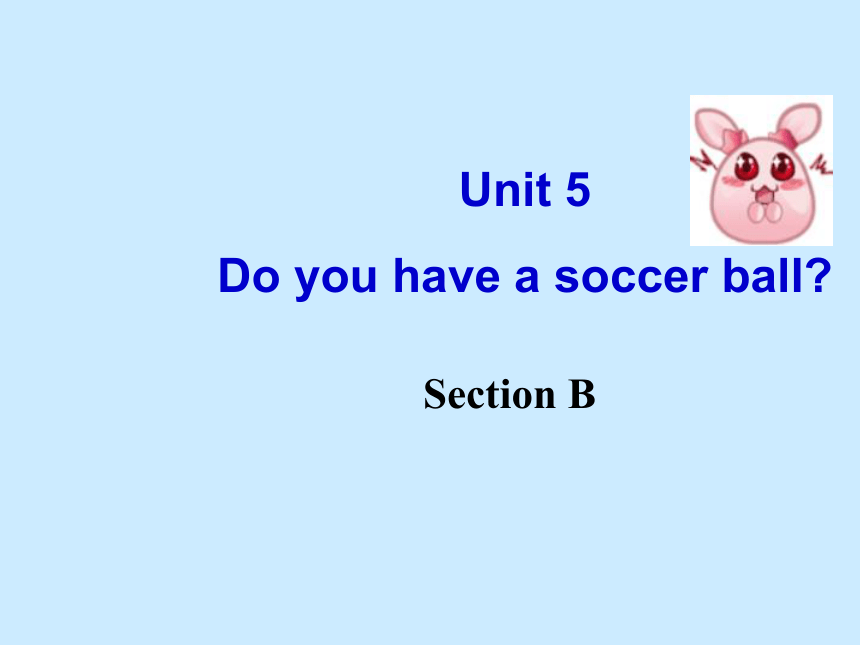 | |
| 格式 | ppt | ||
| 文件大小 | 1.8MB | ||
| 资源类型 | 教案 | ||
| 版本资源 | 人教新目标(Go for it)版 | ||
| 科目 | 英语 | ||
| 更新时间 | 2022-11-11 13:30:36 | ||
图片预览

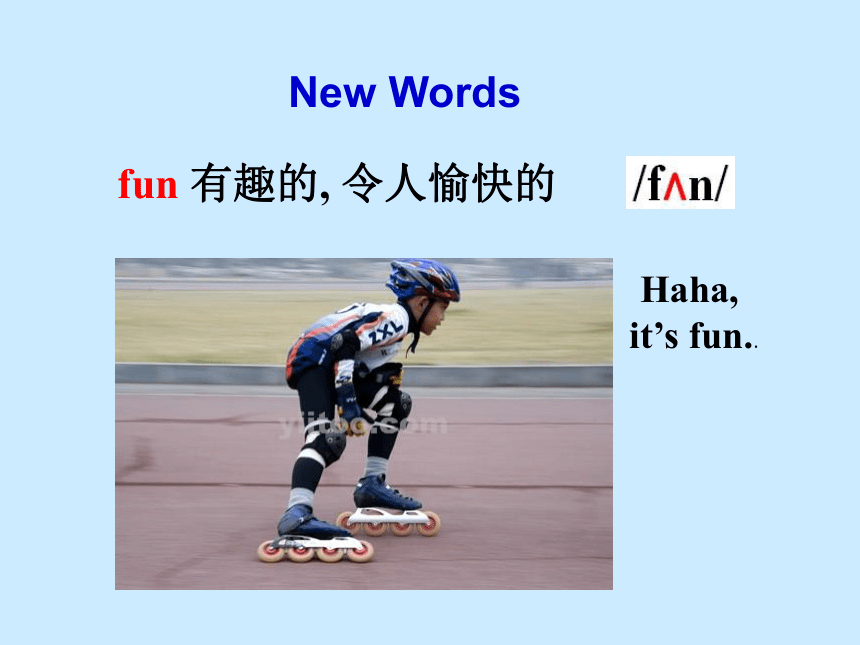
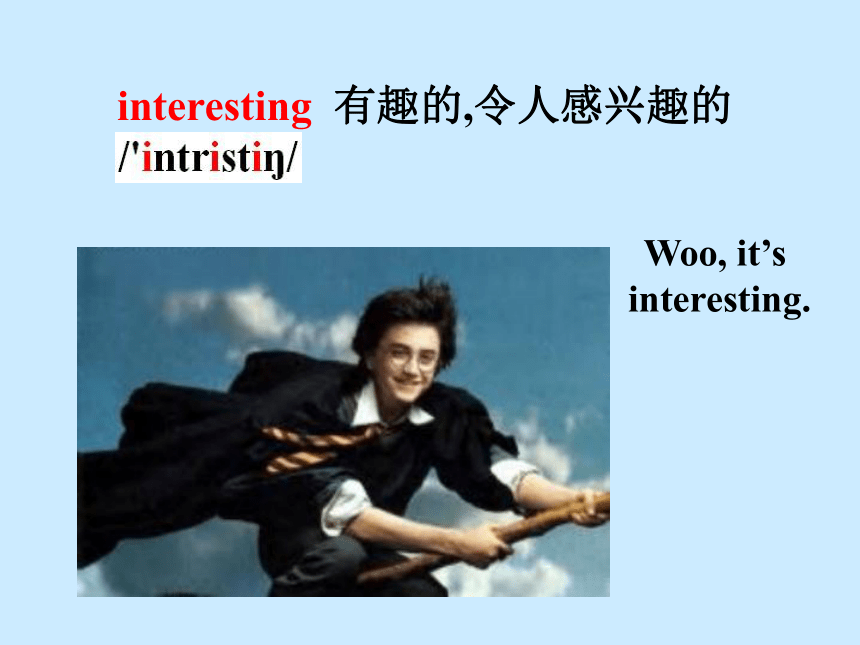
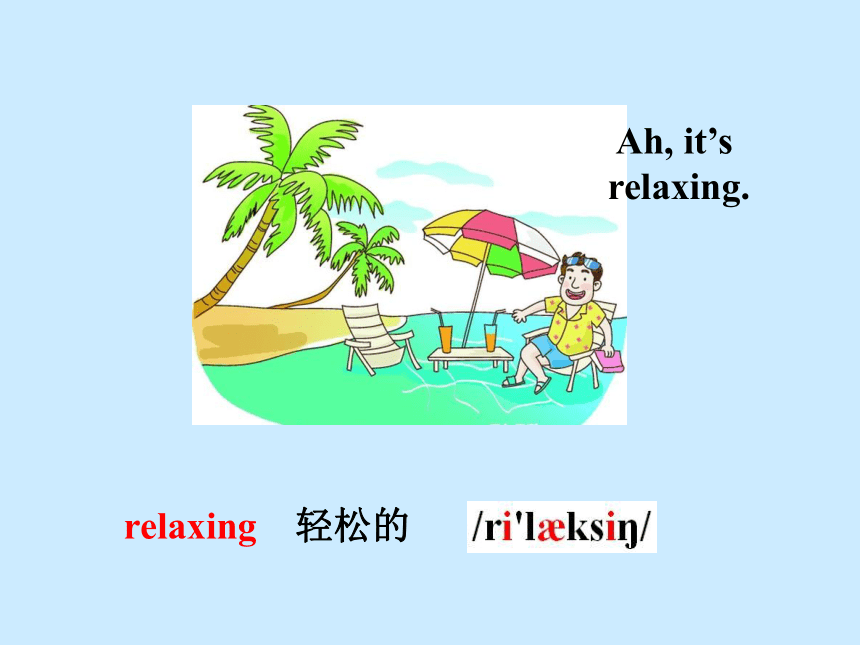
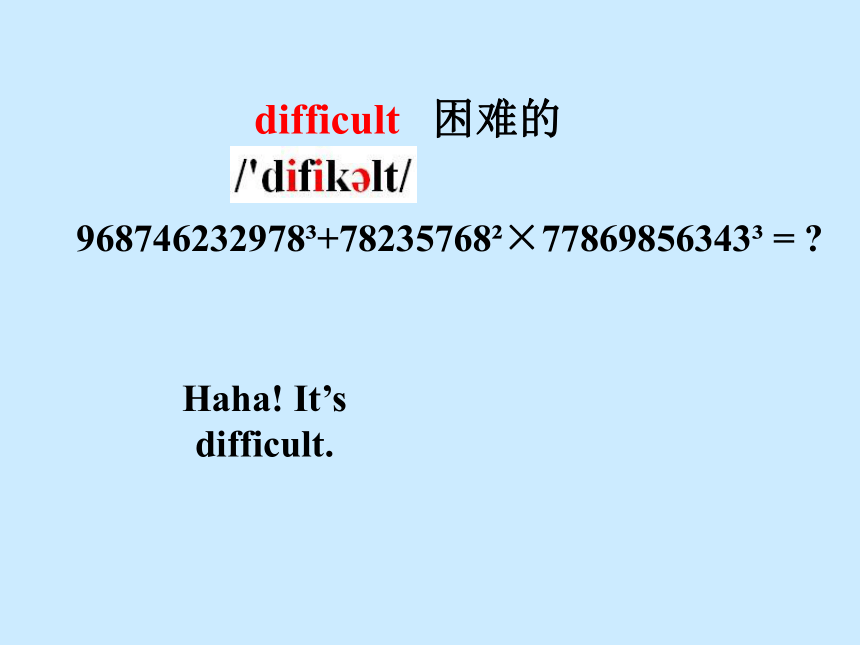
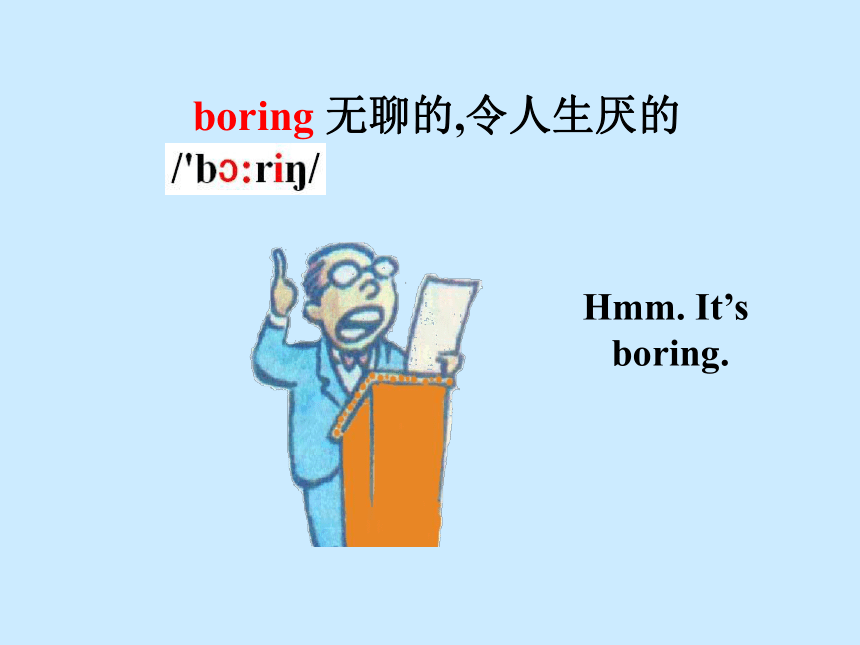
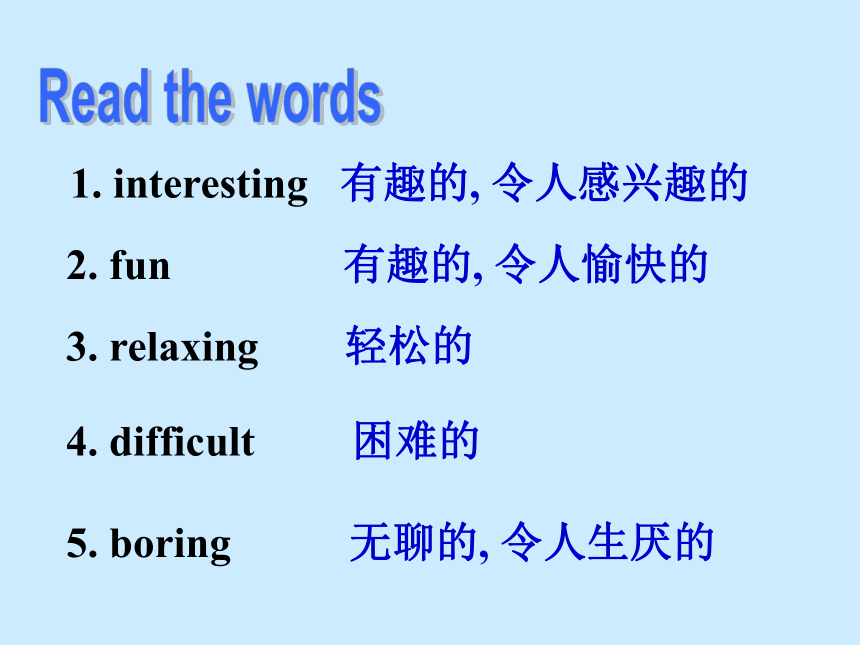
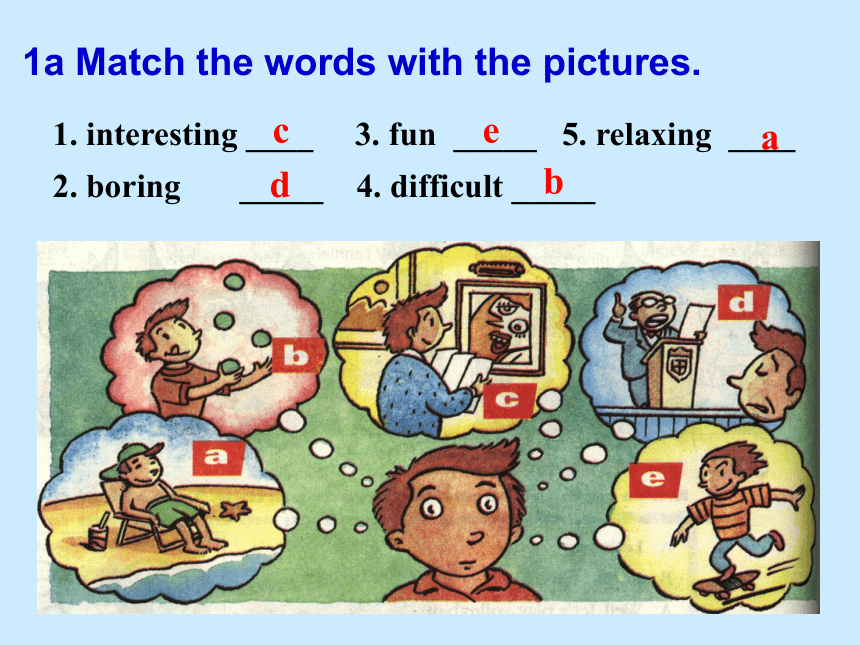
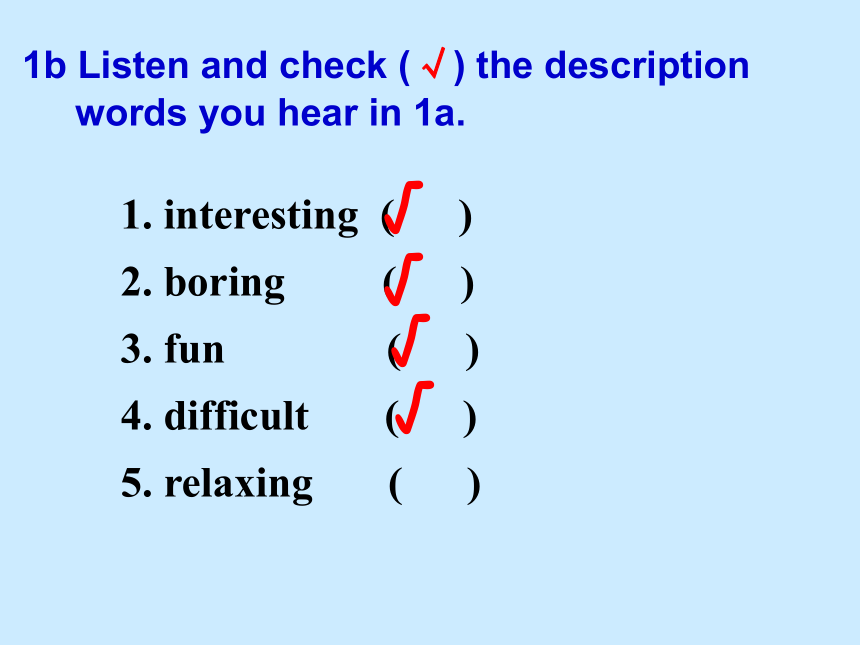
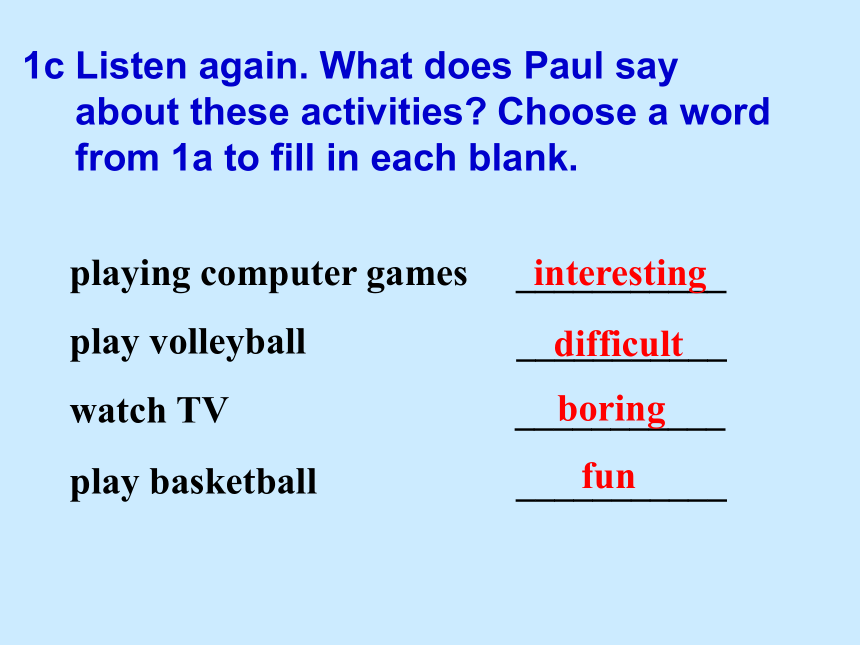
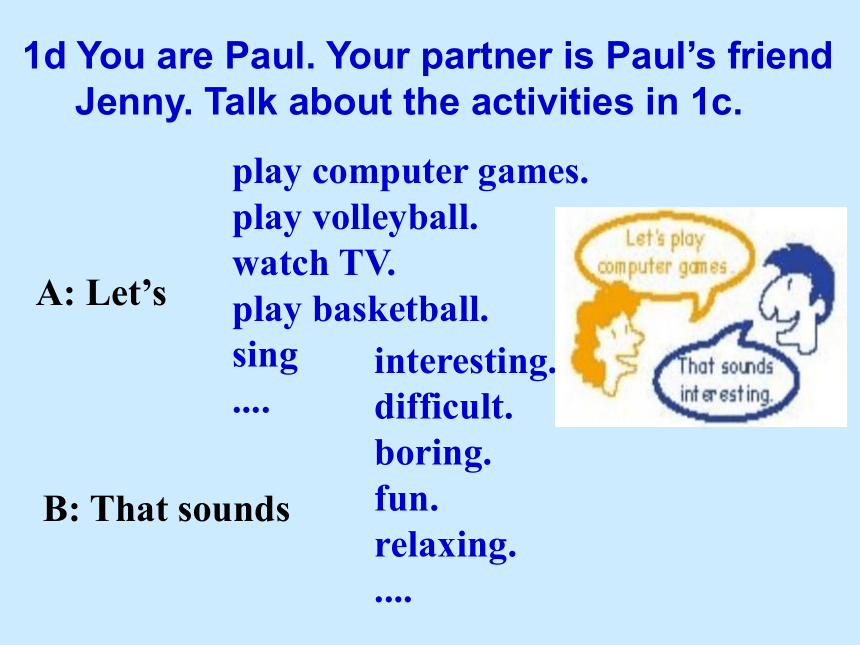
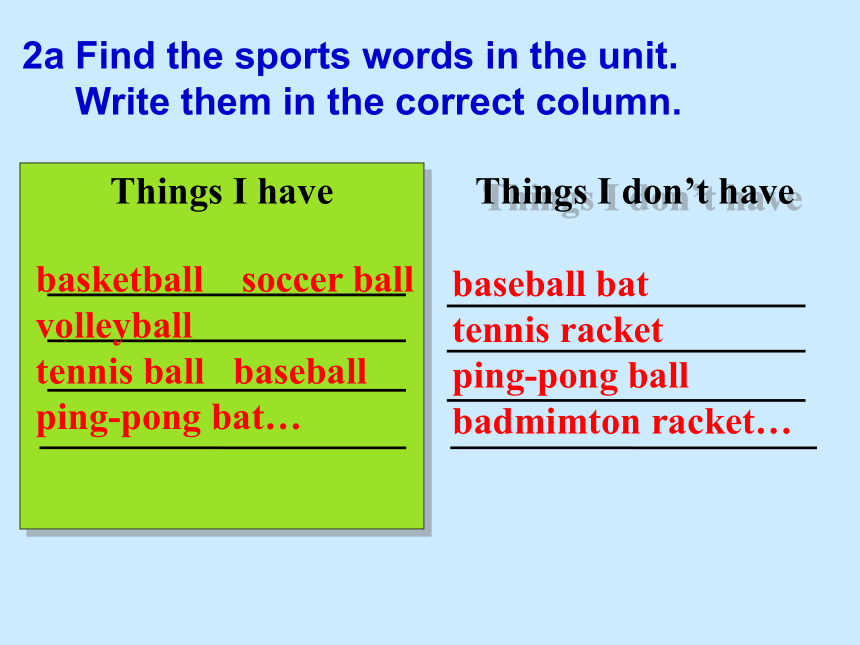
文档简介
(共39张PPT)
Unit 5
Do you have a soccer ball
Section B
Haha,
it’s fun..
New Words
fun 有趣的, 令人愉快的
Woo, it’s
interesting.
interesting 有趣的,令人感兴趣的
Ah, it’s
relaxing.
relaxing 轻松的
Haha! It’s
difficult.
968746232978 +78235768 ×77869856343 =
difficult 困难的
Hmm. It’s
boring.
boring 无聊的,令人生厌的
4. difficult 困难的
5. boring 无聊的, 令人生厌的
3. relaxing 轻松的
2. fun 有趣的, 令人愉快的
1. interesting 有趣的, 令人感兴趣的
1a Match the words with the pictures.
1. interesting ____ 3. fun _____ 5. relaxing ____
2. boring _____ 4. difficult _____
c
e
d
b
a
1. interesting ( )
2. boring ( )
3. fun ( )
4. difficult ( )
5. relaxing ( )
√
√
√
√
1b Listen and check (√) the description
words you hear in 1a.
playing computer games ___________
play volleyball ___________
watch TV ___________
play basketball ___________
interesting
difficult
boring
fun
1c Listen again. What does Paul say
about these activities Choose a word
from 1a to fill in each blank.
play computer games.
play volleyball.
watch TV.
play basketball.
sing
....
A: Let’s
B: That sounds
interesting.
difficult.
boring.
fun.
relaxing.
....
1d You are Paul. Your partner is Paul’s friend
Jenny. Talk about the activities in 1c.
2a Find the sports words in the unit.
Write them in the correct column.
Things I have
Things I don’t have
basketball soccer ball
volleyball
tennis ball baseball
ping-pong bat…
baseball bat
tennis racket
ping-pong ball
badmimton racket…
2b Read the survey results in school
magazine and answer the question:
Who has a soccer ball
Frank Brown
I (not)have a soccer ball,
(但是)my brother Alan . We go to same school and we love soccer.we play it (在)school our friends. It’s relaxing.
but
does
the
at
with
don’t
Gina Smith:
Yes, I do. I have two (足球), three (排球), four
(篮球)and five (棒球) and (球棒) . I love sports, but I don’t play (他们) --- I only them !
(在电视上看。。。)
soccer balls
volleyballs
basketballs
baseballs
bats
them
watch
on TV
Wang Wei:
No, I don’t. Soccer is (困难的). I (喜欢)ping-pong. .(它对我来说是容易的) I have three ping-pong balls and two ping-pong bats.
Class(课后), I ping-pong my classmates.
difficult
like
It’s easy for me
play
with
After
2c Who dou you think says these sentences
Check (√) F for Frank, G for Gina or
W for Wang Wei.
I play ping-pong with my classmates
after class.
2. I have soccer balls, basketballs, volleyballs
and baseballs.
3. My brother has a soccet ball but I don’t.
4. I only watch sports on TV.
5. Soccer is not easy for me.
6. My brother and I are in the same school.
F
G
W
√
√
√
√
√
√
3a Write more questions about sports
equipment.
Do you have a soccer ball
2.
3.
4.
5.
6.
Sports Survey
( ) Yes, I do. ( ) No, I don’t.
( ) Yes, I do. ( ) No, I don’t.
( ) Yes, I do. ( ) No, I don’t.
( ) Yes, I do. ( ) No, I don’t.
( ) Yes, I do. ( ) No, I don’t.
( ) Yes, I do. ( ) No, I don’t.
Do you have a basketball
Do you have a ping-pong bat
Do you have a volleyball
Do you have a baseball
Do you have a tennis racket
3b Exchange books with a partner. Answer
his or her questions in 3a.
Do you have a soccer ball
Yes, I do.
Do you have a tennis racket
No, I don’t. But I have two tennis balls.
3c Look at the information in 3a. Write about
yourself and your partner with but.
I don’t have a baseball, but I have a soccer ball.
Tom has a baseball, but he doesn’t have a baseball bat.
I like sports. I have a small
sports collection. I have a baseball,
I have a tennis racket, I have a
ping-pong ball. But I don’t have
a volleyball. I play sports every
day.
(运动收藏品)
[k 'lek n]
He/She has …
But he/she doesn’t have …
He/She doesn’t have …
He/She plays sports every day./
He/She doesn’t play sports,
he/she only watches them on TV.
He/She likes sports .He/She has a great /small sports collection. He/She has…
1. Let’s play computer games.
1) let’s引导的句子是祈使句, 表示请求或建议,
意思是“让我们……吧!”, 后接动词原形。如:
Let’s go home. 让我们回家吧!
2) 其否定句常在Let’s后加not, 如:
Let’s not go there. 我们不去那里了吧。
3) 但是let 引导其它祈使句时, 则在句首加Don’t。
e.g. Don’t let him in. 别让他进来。
Explanation
其他形式的祈使句:
1) be 引导的祈使句
Be quiet, please.
2) 行为动词引导的祈使句
Look at me, please.
2. That sounds interesting. 听起来很有趣。
句中的sound是系动词, 意思是“听起来”,其后接形容词作系表结构. 类似的系动词还有:look(看起来), taste (尝起来), smell (闻起来) 这些词后都可以接形容词或名词, 表示情况或状况.
如: You look young. 你看起来很年轻。
It tastes good. 这尝起来很香。
3. Gina Smith has two soccer balls.
当主语为第三人称单数时, 动词have要
变成第三人称has。如:
He has two sisters. 他有两个妹妹。
Mary has a computer game.
玛丽有一个游戏机。
人称 单数 复数
第一人称 I We 我们
第二人称 You 你 You 你们
第三人称 He/she/it They 他们
句子的构成:
主语(人称代词或名词) + 谓语(动词) +宾语(名词)
He has a sister.
4. But she doesn’t play sports.
1)主语为第三人称单数的一般现在时的
否定句式为: 主语+doesn’t+动词原形
+其它。如: My mother doesn’t like dogs.
我妈妈不喜欢狗。
She doesn’t have a book.
她没有书。
变陈述句为一般疑问句或否定句时, 要借助助动词Do或Does构成, 例如:
--Do you have a pen
--Yes, I do./No, I don’t.
--Does Tom have a ball
--Yes, he does./No, he doesn’t.
I don’t have a TV.
She doesn’t have a brother.
2) but是表示转折意义的连词, 常用于
连接两个意思相对的并列成份。如:
She likes sports very much, but she
doesn’t like soccer.
她非常喜欢体育运动, 但是不喜欢足球。
5. She only watches them on TV!
them为代词they的宾格形式, 在句中
做宾语。例如:
I like them. 我喜欢他们。
Do you know them 你认识他们吗?
2) 句中的介词on在此处表示借助于某种
工具或手段。如:
They are talking on the phone.
他们在通电话。
watch TV 和watch …on TV的区别:
watch TV 为固定搭配, 意思为“看电视”。
watch …on TV是“在电视上看……”介词
必须用on。
Exercises
Ⅰ. 单选
1. I ________ TV at night(在晚上).
A. look at B. see C. watch D. Look
2. Let’s ______ the map on the wall.
A. look at B. see C. watch D. look
3. I can ____ many things on the table.
A. look at B. see C. watch D. look
C
A
B
4. The question is not easy. It’s very ____.
A. difficult B. difficulty
C. relating D. not difficult
5. Let’s play _____ basketball. I don’t like
playing _____violin(小提琴)at home.
A. the, the B. the, × C. ×, the D. ×, ×
解析: play 后加球类名词时不需要冠词the,但
后加的是乐器类名词必须加the。
A
C
6. ________ our club, please!
A. Join B. Join in C. Come D. Go
7. Let’s ____ and ____ football on the
playground.
A. to go, to play B. go, play
C. to go, play D. go, to play
8. --________ they have any sports collections
--Yes, they ________.
A. Are, are B. Do, do
C. Can, do D. Do, can
A
B
B
Ⅱ. 根据句意和提示填空
1. -- Let’s _________________(踢足球).
-- That sounds ____________(很有趣).
2. -- Let’s play basketball.
-- I ____________ (没有)a basketball.
-- Let’s play ping-pong.
-- ________________ (那太好了).
3. -- _____ you _______ (你有) a baseball bat
-- No, I don’t.
-- Let’s ___________ (看电视).
-- That sounds _________ (没意思).
play soccer ball
interesting
don’t have
That sounds good
Do
boring
watch TV
have
Ⅲ. Fill in the blanks with have, has,
don’t, doesn’t.
1. I _____ a book and he _____ a pen.
2. They _____ a color TV. They _____ have a
computer.
3. She ____ a sister. He _____ a brother.
4. I _____ have computer. Tom _____ one.
have
has
have
don’t
has
has
don’t
has
5. Does he ________ a computer
No, he _________.
6. --Do you _________ a backpack
--Yes, I _______.
7. --Does she _________ a ruler.
--Yes, she ________.
have
do
have
does
have
doesn’t
Unit 5
Do you have a soccer ball
Section B
Haha,
it’s fun..
New Words
fun 有趣的, 令人愉快的
Woo, it’s
interesting.
interesting 有趣的,令人感兴趣的
Ah, it’s
relaxing.
relaxing 轻松的
Haha! It’s
difficult.
968746232978 +78235768 ×77869856343 =
difficult 困难的
Hmm. It’s
boring.
boring 无聊的,令人生厌的
4. difficult 困难的
5. boring 无聊的, 令人生厌的
3. relaxing 轻松的
2. fun 有趣的, 令人愉快的
1. interesting 有趣的, 令人感兴趣的
1a Match the words with the pictures.
1. interesting ____ 3. fun _____ 5. relaxing ____
2. boring _____ 4. difficult _____
c
e
d
b
a
1. interesting ( )
2. boring ( )
3. fun ( )
4. difficult ( )
5. relaxing ( )
√
√
√
√
1b Listen and check (√) the description
words you hear in 1a.
playing computer games ___________
play volleyball ___________
watch TV ___________
play basketball ___________
interesting
difficult
boring
fun
1c Listen again. What does Paul say
about these activities Choose a word
from 1a to fill in each blank.
play computer games.
play volleyball.
watch TV.
play basketball.
sing
....
A: Let’s
B: That sounds
interesting.
difficult.
boring.
fun.
relaxing.
....
1d You are Paul. Your partner is Paul’s friend
Jenny. Talk about the activities in 1c.
2a Find the sports words in the unit.
Write them in the correct column.
Things I have
Things I don’t have
basketball soccer ball
volleyball
tennis ball baseball
ping-pong bat…
baseball bat
tennis racket
ping-pong ball
badmimton racket…
2b Read the survey results in school
magazine and answer the question:
Who has a soccer ball
Frank Brown
I (not)have a soccer ball,
(但是)my brother Alan . We go to same school and we love soccer.we play it (在)school our friends. It’s relaxing.
but
does
the
at
with
don’t
Gina Smith:
Yes, I do. I have two (足球), three (排球), four
(篮球)and five (棒球) and (球棒) . I love sports, but I don’t play (他们) --- I only them !
(在电视上看。。。)
soccer balls
volleyballs
basketballs
baseballs
bats
them
watch
on TV
Wang Wei:
No, I don’t. Soccer is (困难的). I (喜欢)ping-pong. .(它对我来说是容易的) I have three ping-pong balls and two ping-pong bats.
Class(课后), I ping-pong my classmates.
difficult
like
It’s easy for me
play
with
After
2c Who dou you think says these sentences
Check (√) F for Frank, G for Gina or
W for Wang Wei.
I play ping-pong with my classmates
after class.
2. I have soccer balls, basketballs, volleyballs
and baseballs.
3. My brother has a soccet ball but I don’t.
4. I only watch sports on TV.
5. Soccer is not easy for me.
6. My brother and I are in the same school.
F
G
W
√
√
√
√
√
√
3a Write more questions about sports
equipment.
Do you have a soccer ball
2.
3.
4.
5.
6.
Sports Survey
( ) Yes, I do. ( ) No, I don’t.
( ) Yes, I do. ( ) No, I don’t.
( ) Yes, I do. ( ) No, I don’t.
( ) Yes, I do. ( ) No, I don’t.
( ) Yes, I do. ( ) No, I don’t.
( ) Yes, I do. ( ) No, I don’t.
Do you have a basketball
Do you have a ping-pong bat
Do you have a volleyball
Do you have a baseball
Do you have a tennis racket
3b Exchange books with a partner. Answer
his or her questions in 3a.
Do you have a soccer ball
Yes, I do.
Do you have a tennis racket
No, I don’t. But I have two tennis balls.
3c Look at the information in 3a. Write about
yourself and your partner with but.
I don’t have a baseball, but I have a soccer ball.
Tom has a baseball, but he doesn’t have a baseball bat.
I like sports. I have a small
sports collection. I have a baseball,
I have a tennis racket, I have a
ping-pong ball. But I don’t have
a volleyball. I play sports every
day.
(运动收藏品)
[k 'lek n]
He/She has …
But he/she doesn’t have …
He/She doesn’t have …
He/She plays sports every day./
He/She doesn’t play sports,
he/she only watches them on TV.
He/She likes sports .He/She has a great /small sports collection. He/She has…
1. Let’s play computer games.
1) let’s引导的句子是祈使句, 表示请求或建议,
意思是“让我们……吧!”, 后接动词原形。如:
Let’s go home. 让我们回家吧!
2) 其否定句常在Let’s后加not, 如:
Let’s not go there. 我们不去那里了吧。
3) 但是let 引导其它祈使句时, 则在句首加Don’t。
e.g. Don’t let him in. 别让他进来。
Explanation
其他形式的祈使句:
1) be 引导的祈使句
Be quiet, please.
2) 行为动词引导的祈使句
Look at me, please.
2. That sounds interesting. 听起来很有趣。
句中的sound是系动词, 意思是“听起来”,其后接形容词作系表结构. 类似的系动词还有:look(看起来), taste (尝起来), smell (闻起来) 这些词后都可以接形容词或名词, 表示情况或状况.
如: You look young. 你看起来很年轻。
It tastes good. 这尝起来很香。
3. Gina Smith has two soccer balls.
当主语为第三人称单数时, 动词have要
变成第三人称has。如:
He has two sisters. 他有两个妹妹。
Mary has a computer game.
玛丽有一个游戏机。
人称 单数 复数
第一人称 I We 我们
第二人称 You 你 You 你们
第三人称 He/she/it They 他们
句子的构成:
主语(人称代词或名词) + 谓语(动词) +宾语(名词)
He has a sister.
4. But she doesn’t play sports.
1)主语为第三人称单数的一般现在时的
否定句式为: 主语+doesn’t+动词原形
+其它。如: My mother doesn’t like dogs.
我妈妈不喜欢狗。
She doesn’t have a book.
她没有书。
变陈述句为一般疑问句或否定句时, 要借助助动词Do或Does构成, 例如:
--Do you have a pen
--Yes, I do./No, I don’t.
--Does Tom have a ball
--Yes, he does./No, he doesn’t.
I don’t have a TV.
She doesn’t have a brother.
2) but是表示转折意义的连词, 常用于
连接两个意思相对的并列成份。如:
She likes sports very much, but she
doesn’t like soccer.
她非常喜欢体育运动, 但是不喜欢足球。
5. She only watches them on TV!
them为代词they的宾格形式, 在句中
做宾语。例如:
I like them. 我喜欢他们。
Do you know them 你认识他们吗?
2) 句中的介词on在此处表示借助于某种
工具或手段。如:
They are talking on the phone.
他们在通电话。
watch TV 和watch …on TV的区别:
watch TV 为固定搭配, 意思为“看电视”。
watch …on TV是“在电视上看……”介词
必须用on。
Exercises
Ⅰ. 单选
1. I ________ TV at night(在晚上).
A. look at B. see C. watch D. Look
2. Let’s ______ the map on the wall.
A. look at B. see C. watch D. look
3. I can ____ many things on the table.
A. look at B. see C. watch D. look
C
A
B
4. The question is not easy. It’s very ____.
A. difficult B. difficulty
C. relating D. not difficult
5. Let’s play _____ basketball. I don’t like
playing _____violin(小提琴)at home.
A. the, the B. the, × C. ×, the D. ×, ×
解析: play 后加球类名词时不需要冠词the,但
后加的是乐器类名词必须加the。
A
C
6. ________ our club, please!
A. Join B. Join in C. Come D. Go
7. Let’s ____ and ____ football on the
playground.
A. to go, to play B. go, play
C. to go, play D. go, to play
8. --________ they have any sports collections
--Yes, they ________.
A. Are, are B. Do, do
C. Can, do D. Do, can
A
B
B
Ⅱ. 根据句意和提示填空
1. -- Let’s _________________(踢足球).
-- That sounds ____________(很有趣).
2. -- Let’s play basketball.
-- I ____________ (没有)a basketball.
-- Let’s play ping-pong.
-- ________________ (那太好了).
3. -- _____ you _______ (你有) a baseball bat
-- No, I don’t.
-- Let’s ___________ (看电视).
-- That sounds _________ (没意思).
play soccer ball
interesting
don’t have
That sounds good
Do
boring
watch TV
have
Ⅲ. Fill in the blanks with have, has,
don’t, doesn’t.
1. I _____ a book and he _____ a pen.
2. They _____ a color TV. They _____ have a
computer.
3. She ____ a sister. He _____ a brother.
4. I _____ have computer. Tom _____ one.
have
has
have
don’t
has
has
don’t
has
5. Does he ________ a computer
No, he _________.
6. --Do you _________ a backpack
--Yes, I _______.
7. --Does she _________ a ruler.
--Yes, she ________.
have
do
have
does
have
doesn’t
同课章节目录
- starters 预备篇(2012秋审查)
- Unit 1 Good morning !
- Unit 2 What’s this in English?
- Unit 3 What color is it ?
- Unit 1 My name's Gina.
- Section A
- Section B
- Unit 2 This is my sister.
- Section A
- Section B
- Unit 3 Is this your pencil?
- Section A
- Section B
- Unit 4 Where's my schoolbag?
- Section A
- Section B
- Unit 5 Do you have a soccer ball?
- Section A
- Section B
- Unit 6 Do you like bananas?
- Section A
- Section B
- Unit 7 How much are these socks?
- Section A
- Section B
- Unit 8 When is your birthday?
- Section A
- Section B
- Unit 9 My favorite subject is science.
- Section A
- Section B
